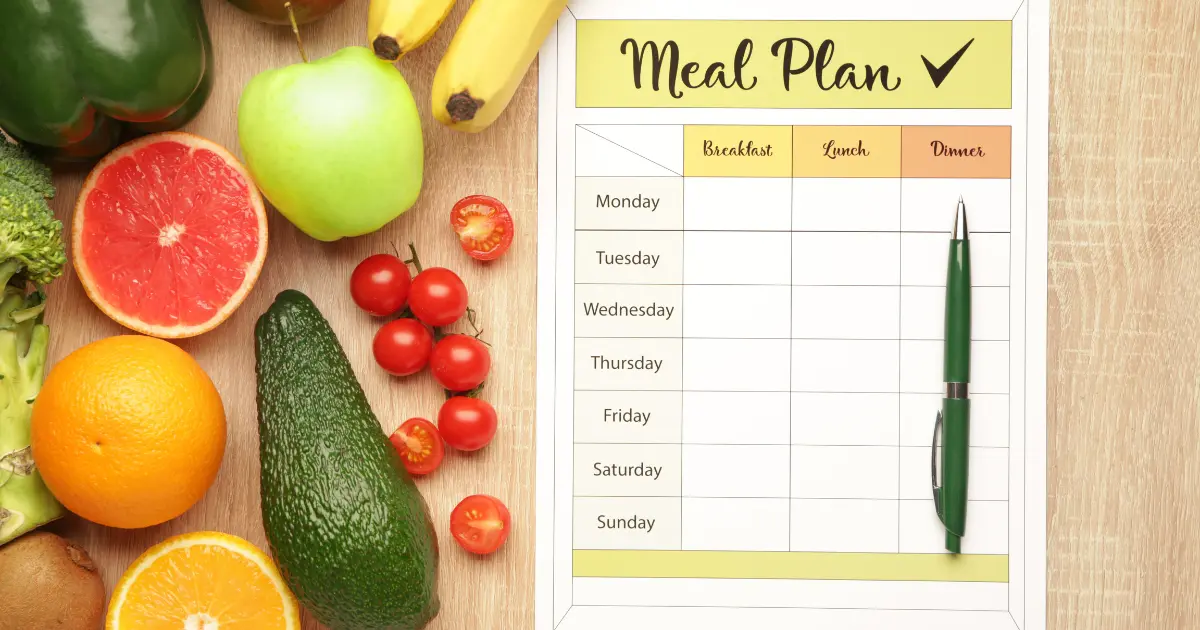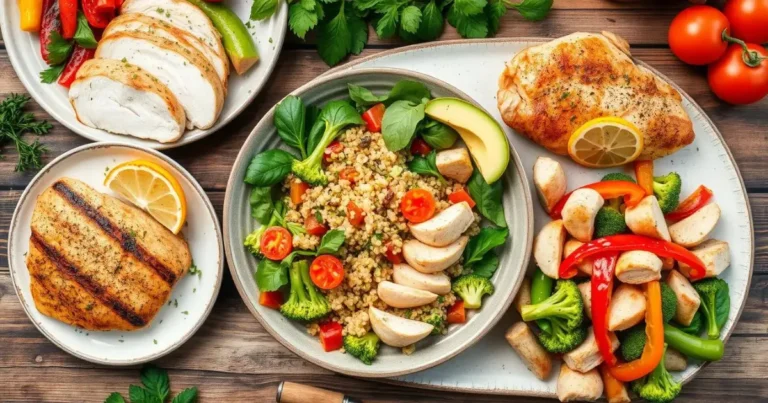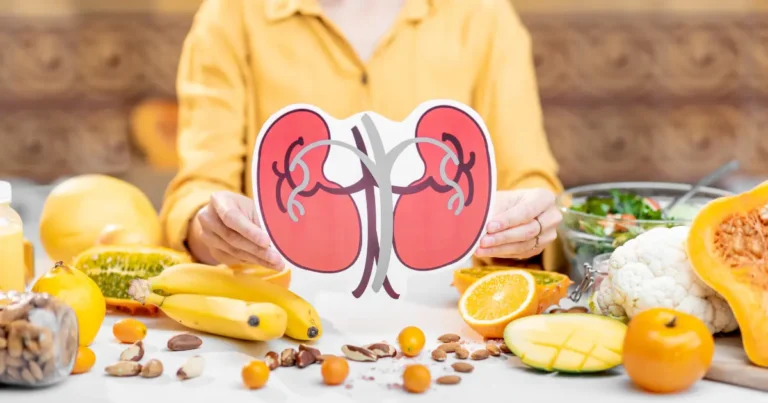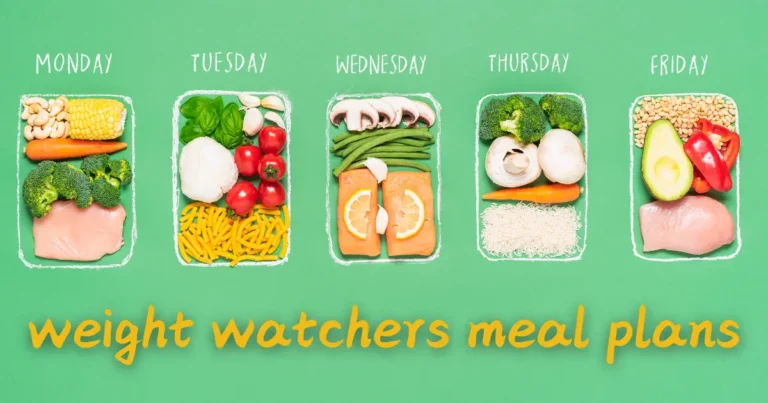7-Day Meal Plan for Kidney Disease Management
Managing kidney disease means watching what you eat closely. You need to get the right nutrients while keeping an eye on sodium, potassium, and phosphorus. This 7-day meal plan for kidney disease helps support your kidney health and overall well-being.
Filled with expert recipes, nutritional advice, and useful tips, this plan ensures your diet is both healthy and tasty.
Table of Contents
Key Takeaways
- A 7-day meal plan tailored for individuals with kidney disease
- Recipes and meal options that support kidney function and recovery
- Guidance on portion control, meal timing, and snack choices
- Tips for working with your healthcare team to manage your kidney-friendly diet
- Strategies to incorporate a variety of nutrient-dense foods while limiting sodium, potassium, and phosphorus
Understanding Kidney Disease and Dietary Needs
For people with kidney disease, eating right is key. Knowing which nutrients to watch and how diet affects kidney health helps manage the condition. This can greatly improve your overall health.
Key Nutrients to Monitor
It’s important to keep an eye on certain nutrients for those with kidney disease. These include:
- Protein: It’s crucial to control protein intake to avoid waste buildup in the blood.
- Sodium: Reducing sodium helps manage fluid balance and blood pressure, vital for kidney health.
- Potassium: Keeping potassium levels balanced is important, as too much or too little can be harmful.
- Phosphorus: It’s essential to limit phosphorus intake to avoid blood buildup, which can cause problems.
The Role of Diet in Kidney Health
Eating a kidney-friendly diet can slow kidney disease progression and prevent damage. By choosing foods good for kidneys and kidney healthy foods, you support your kidney function. This reduces the risk of complications.
Working with Your Healthcare Team
Working with your healthcare team is crucial. This includes a nephrologist and a registered dietitian. They help create a meal plan tailored to your needs. Their guidance and support are invaluable in making dietary changes for kidney disease management.
“A balanced, kidney-friendly diet can make a significant difference in managing your condition and improving your quality of life.”
Foods That Support Kidney Health and Recovery
If you have kidney disease, eating foods that are good for your kidneys is key. These foods can help your kidneys work better and improve your health. Let’s look at some foods that are great for your kidneys and overall health.
Kidney-Healthy Produce
- Blueberries: These berries are full of antioxidants. They might help lower inflammation and protect your kidney cells.
- Cabbage: It’s high in fiber and low in potassium. Cabbage is easy to add to your meals.
- Cauliflower: A low-potassium veggie, cauliflower is packed with vitamin C and folate.
Lean Protein Sources
- Chicken: Choose skinless, white meat chicken. It’s low in phosphorus.
- Eggs: Eggs are good for your kidneys. You can cook them in many ways.
- Salmon: This fish is full of omega-3s. Omega-3s might help lower inflammation and support your kidneys.
Whole Grains and Legumes
Add whole grains like brown rice and quinoa to your meals. Also, include legumes like lentils and black beans. These foods are low in sodium, potassium, and phosphorus. They’re good for people with kidney disease.
| Food | Nutrients Provided | Benefits for Kidney Health |
| Blueberries | Antioxidants, fiber, vitamin C | May reduce inflammation and protect kidney cells |
| Salmon | Omega-3 fatty acids, protein | May help reduce inflammation and support kidney function |
| Lentils | Fiber, protein, folate | These are kidney-friendly due to their low levels of sodium, potassium, and phosphorus |
Eating kidney healthy foods can help your kidneys and aid in recovery. Always talk to your healthcare team. They can help you create a diet plan that’s right for you.
7-Day Meal Plan for Kidney Disease: Your Weekly Guide
Managing kidney disease means eating the right foods. We’ve made a 7-day meal plan for you. It’s designed to meet the dietary needs of those with kidney disease.
Portion Control Guidelines
It’s crucial to control your portions on a kidney-friendly diet. Here are some guidelines:
- Protein: 3-4 ounces per meal
- Carbohydrates: 1/2 cup per meal
- Fruits and vegetables: 1 cup per meal
- Fluids: 8-12 cups per day, or as your doctor advises
Meal Timing Recommendations
Eating at the same times every day helps your body. We recommend:
- Breakfast: 7-8 AM
- Lunch: 12-1 PM
- Dinner: 6-7 PM
- Snacks: Mid-morning and mid-afternoon
Snack Options and Modifications
Snacks are key in a kidney-friendly diet. They give you energy and nutrients. Here are some ideas:
- Fruits: Berries, melon, and citrus fruits
- Vegetables: Sliced carrots, cucumber, and bell peppers
- Dairy: Low-fat yogurt or cottage cheese
- Whole grains: Small portions of whole-grain crackers or rice cakes
Remember, you might need to adjust portion sizes and snacks based on your health. Always talk to your healthcare team for a plan that fits you.
By sticking to this 7-day meal plan, you’re taking a big step towards managing your kidney disease. It’s a great way to improve your diet for kidneys. Let’s get started with the daily meal plans!
Monday’s Meal Plan: Starting Your Week Right
Start your week with a healthy meal plan that’s good for your kidneys. This plan includes foods good for kidneys and kidney healthy foods. It helps nourish your body and support your kidney health.
Breakfast: Oatmeal with Berries
Begin with oatmeal, a grain that’s easy on your kidneys. Add berries like blueberries, raspberries, or strawberries for extra vitamins and minerals.
Lunch: Grilled Salmon with Roasted Vegetables
For lunch, try grilled salmon, a protein that’s good for your heart and kidneys. Serve it with roasted veggies like bell peppers, zucchini, and asparagus for extra nutrients.
Dinner: Quinoa and Spinach Salad
For dinner, enjoy a quinoa and spinach salad. Quinoa is a protein-rich grain that’s gentle on your kidneys. Spinach adds vitamins and minerals.
Snack: Greek Yogurt with Nuts
For a snack, choose Greek yogurt with nuts like almonds or walnuts. This mix offers protein, healthy fats, and minerals.
| Meal | Dish | Nutrients |
| Breakfast | Oatmeal with Berries | Fiber, Vitamins, Antioxidants |
| Lunch | Grilled Salmon with Roasted Vegetables | Protein, Omega-3s, Vitamins, Minerals |
| Dinner | Quinoa and Spinach Salad | Protein, Fiber, Vitamins, Minerals |
| Snack | Greek Yogurt with Nuts | Protein, Healthy Fats, Minerals |
This Monday meal plan is packed with kidney healthy foods. It supports your kidney function and overall health. A balanced diet is key to managing kidney disease and staying healthy.
Tuesday’s Kidney-Friendly Recipes and Portions
Keeping a diet for kidneys is key when you have kidney disease. On Tuesdays, you can enjoy foods that heal kidney while watching your portions. This day’s menu has balanced meals for breakfast, lunch, and dinner to help your kidneys.
Breakfast Options
- Overnight oats with blueberries and a sprinkle of cinnamon
- Scrambled eggs with sautéed spinach and whole-grain toast
- Greek yogurt garnished with sliced almonds and a drizzle of honey
Lunch Suggestions
- Grilled salmon salad with mixed greens, cherry tomatoes, and a lemon vinaigrette
- Quinoa and roasted vegetable bowl with avocado and a side of baked sweet potato
- Whole-wheat pita stuffed with hummus, cucumber, and roasted red peppers
Dinner Recipes
For dinner, try these kidney-friendly dishes:
| Dish | Portion Size | Key Nutrients |
| Baked chicken with roasted broccoli and brown rice | 4 oz chicken, 1 cup broccoli, 1/2 cup rice | Protein, fiber, vitamins, and minerals |
| Grilled tilapia with sautéed spinach and quinoa | 3 oz tilapia, 1 cup spinach, 1/2 cup quinoa | Protein, omega-3s, and complex carbohydrates |
| Lentil and vegetable stew with a side of whole-grain bread | 1 cup stew, 1 slice bread | Protein, fiber, and complex carbohydrates |
By eating these kidney-friendly meals, you can feed your body well. This supports your diet for kidneys on Tuesdays.
Wednesday’s Low-Sodium Meal Options
Keeping your sodium intake low is key for a kidney-friendly diet. On Wednesdays, choose low-sodium meals that are good for your kidneys without losing flavor. Here are some tasty and healthy options:
Grilled Salmon with Lemon and Herbs
Salmon is full of omega-3s, which help fight inflammation and support your kidneys. Try it with a lemon-herb marinade and serve with steamed veggies for a balanced meal.
Quinoa and Roasted Vegetable Salad
Quinoa is a great choice for your kidneys because it’s high in protein and low in sodium. Mix it with roasted veggies like bell peppers, zucchini, and onions for a tasty salad.
Grilled Chicken with Lemon-Garlic Seasoning
Grilled chicken is a good protein choice for kidney disease. Season it with lemon, garlic, and herbs for a flavorful, low-sodium meal.
| Food | Sodium Content (mg) |
| Grilled Salmon | 54 |
| Quinoa | 6 |
| Grilled Chicken Breast | 73 |
| Bell Peppers | 2 |
| Zucchini | 5 |
By choosing these kidney-friendly foods, you can have a delicious and healthy meal on Wednesday. It will help support your kidney function.
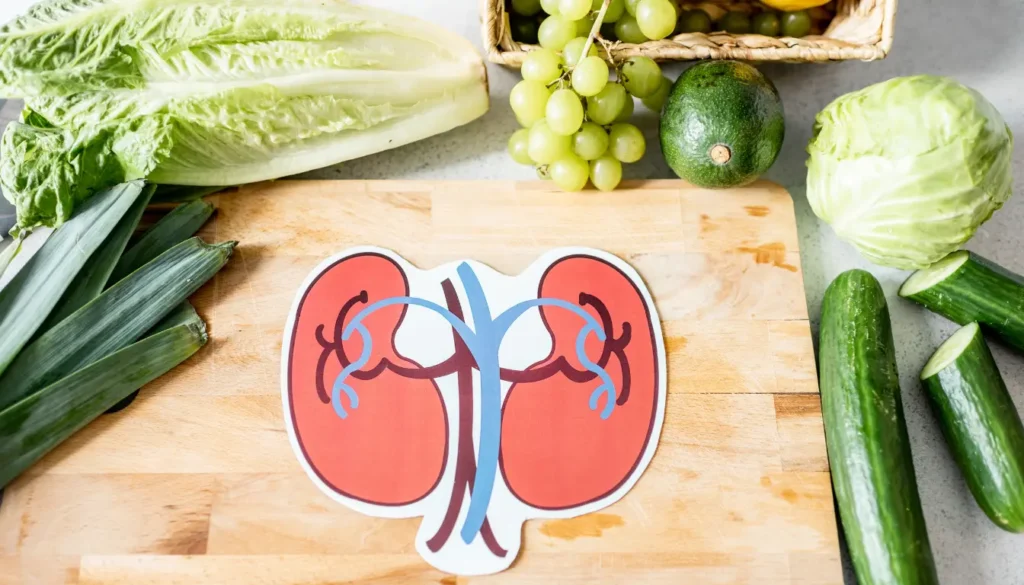
Thursday’s Balanced Kidney Diet Choices
Thursday is a great day to focus on balanced nutrition in your 7-day meal plan for kidney disease. You can eat kidney-friendly foods that give you the nutrients you need. Let’s look at the main meals and snacks that are good for your kidneys on this day.
Main Meals
For Thursday’s main meals, aim for a mix of protein, carbs, and healthy fats. Grilled salmon with roasted sweet potatoes and sautéed spinach is a great choice. It has omega-3s, complex carbs, and lots of vitamins and minerals. Another good option is a quinoa and vegetable stir-fry with kidney-friendly ingredients like bell peppers, onions, and mushrooms.
Healthy Snacks
Snacking is key in a kidney-friendly diet. It helps keep your blood sugar steady and adds more nutrients. Here are some healthy snack ideas for Thursday:
- Fresh fruit, such as berries or citrus slices
- Greek yogurt with a sprinkle of cinnamon
- Hummus with carrot or cucumber sticks
- A small handful of unsalted nuts, such as almonds or walnuts
Remember, it’s important to watch your portion sizes with kidney disease. Talk to your healthcare team to find out the right amounts for you.
By choosing balanced meals on Thursday, you’re giving your body what it needs. This helps support your kidney health.
Friday’s Protein-Controlled Menu
Maintaining a kidney-friendly diet on Fridays can be fun. Focusing on protein-controlled meals is a great way to support your kidneys. This menu offers a balanced approach to help your kidney health.
Breakfast: Egg White Frittata
Begin your day with a protein-packed frittata. It’s made with egg whites, fresh veggies, and low-fat cheese. This dish is high in protein and low in sodium and phosphorus.
Lunch: Grilled Salmon and Steamed Broccoli
For lunch, try grilled salmon with steamed broccoli. Salmon is rich in protein that heals kidney. Broccoli adds vitamin C to support kidney function.
Dinner: Baked Chicken with Roasted Sweet Potatoes
In the evening, enjoy baked chicken breast with roasted sweet potatoes. Chicken is a lean protein good for kidneys. Sweet potatoes add complex carbs and fiber for a balanced meal.
Snack: Greek Yogurt with Berries
For a protein-rich snack, try Greek yogurt with berries. This mix is tasty and nutritious. It boosts your kidney health with protein, vitamins, and antioxidants.
| Meal | Protein (g) | Sodium (mg) | Phosphorus (mg) |
| Egg White Frittata | 20 | 300 | 250 |
| Grilled Salmon and Broccoli | 25 | 150 | 350 |
| Baked Chicken and Sweet Potatoes | 30 | 250 | 400 |
| Greek Yogurt with Berries | 15 | 75 | 150 |
By choosing protein-controlled meals, you can enjoy a balanced and tasty Friday menu. This supports your kidney health and recovery. Always talk to your healthcare team for personalized dietary advice.
Weekend Meal Planning for Kidney Health
As the weekend comes, it’s a great time to plan your meals for kidney health. By being proactive with your diet, you can keep your kidney-friendly lifestyle all week. Let’s look at the menu and tips for Saturday and Sunday.
Saturday’s Menu
Begin your weekend with a balanced breakfast that’s good for your body. Think about a veggie-packed omelet or a smoothie with kidney-friendly fruits and veggies. For lunch, choose a grilled chicken salad with lots of greens and a light dressing.
In the evening, enjoy a lean protein dish like baked salmon or grilled pork chops. Pair it with roasted veggies and a small whole grain serving.
Sunday’s Preparation Tips
- Plan and prepare meals for the week ahead. This keeps you on track with your kidney-friendly diet and avoids unhealthy choices during the week.
- Batch cook meals like soups, stews, or casseroles. They’re easy to reheat and enjoy all week.
- Wash and chop fresh produce like veggies and fruits. This makes quick meal assembly easier.
- Stock up on healthy snacks like raw nuts, seeds, and low-sodium protein bars. They’re great for when you’re hungry.
- Check your weekly schedule for any challenges or events that might need special meal planning.
Spending time on the weekend planning and preparing meals helps you stick to a 7-day meal plan for kidney disease. You’ll nourish your body with kidney healthy foods all week.
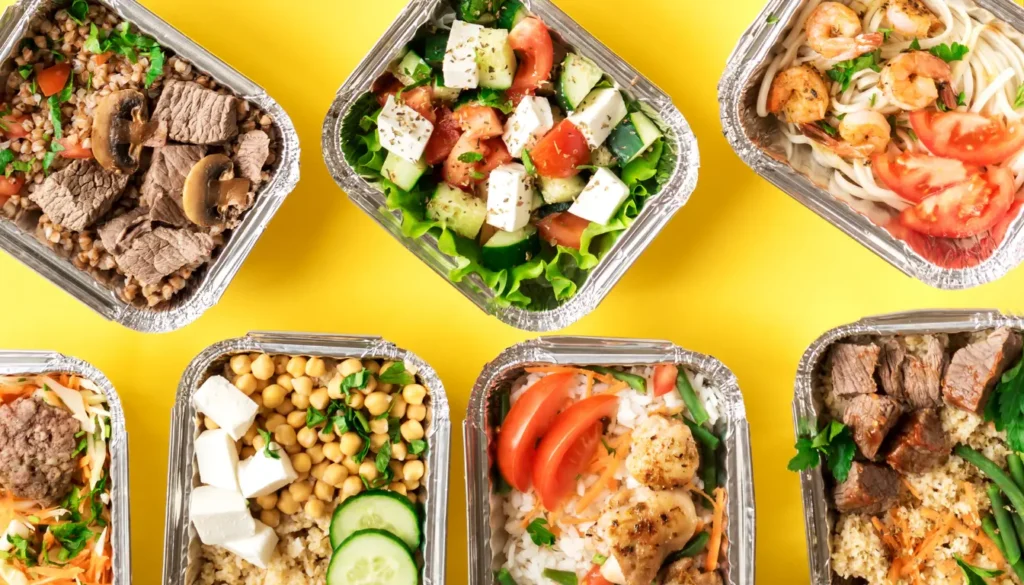
Foods to Avoid with Chronic Kidney Disease
Managing chronic kidney disease (CKD) means watching what you eat closely. Some foods help your kidneys, but others can harm them. Knowing which foods to avoid for CKD helps you make better choices. This way, you can actively support your kidney health through a diet for kidneys.
Here are some key food categories to be mindful of when living with chronic kidney disease:
- High-Sodium Foods: Processed meats, canned soups, packaged snacks, and fast food are all high in sodium. This can be bad for people with CKD.
- High-Phosphorus Foods: Dairy products, nuts, seeds, and whole grains have more phosphorus. This mineral is something to watch when you have kidney problems.
- High-Potassium Foods: Foods like bananas, oranges, tomatoes, potatoes, and leafy greens are full of potassium. But, they might need to be eaten less by those with CKD.
- Protein-Rich Foods: Protein is important, but too much from animal sources like red meat, poultry, and eggs can stress your kidneys.
It’s key to work with your healthcare team to find the right diet for you. By focusing on kidney-friendly foods and avoiding the ones listed, you can help manage your condition. This supports your overall health too.
Tips for Maintaining Your Kidney-Friendly Diet
Following a kidney-friendly diet can be tough, but it’s doable with the right approach. Here are some tips to help you stick to your diet and keep your kidneys healthy.
Eating Out Guidelines
Eating out with dietary restrictions can be hard, but it’s not a no-go. Here’s how to navigate:
- Choose baked, grilled, or steamed foods over fried or sautéed ones.
- Ask for meals without extra salt or salty sauces.
- Go for lean proteins like grilled chicken, fish, or tofu.
- Steer clear of high-sodium condiments and dressings.
- Be mindful of starchy food portions like rice, pasta, or potatoes.
- Drink water and avoid sugary drinks.
Shopping List Essentials
Having kidney-friendly foods at home makes it easier to eat right. Here’s what to buy:
- Fresh fruits and vegetables – pick low-potassium ones like berries, citrus, carrots, and broccoli.
- Lean proteins – such as chicken, fish, eggs, and tofu.
- Whole grains – like brown rice, quinoa, and whole wheat bread.
- Healthy fats – including olive oil, avocado, and nuts.
- Herbs and spices – for flavor without salt.
- Low-sodium broth or stock – for cooking and soups.
Plan ahead and fill your pantry with these foods. This way, you can make healthy meals that are good for your kidneys.
Conclusion
Starting your 7-day meal plan for kidney disease is a big step. It’s key to keep your diet kidney-friendly for your health. By eating the right foods and following meal tips, you help your kidneys and lower health risks.
Changing your lifestyle for better kidney health starts with this meal plan. Talk to your doctor to make your diet fit your needs. With their help and your effort, you can manage your kidney health and look forward to a healthier life.
Your kidney health is up to you. By using these meal planning tips and making smart food choices, you can improve your nutrition. This helps your body heal and boosts your quality of life. Keep up the good work and focus on your kidney-friendly diet for a healthier future.
FAQ
What are the key nutrients to monitor when managing kidney disease?
When you have kidney disease, watch your sodium, potassium, phosphorus, and protein intake. These nutrients are key to keeping your kidneys healthy. It’s important to find the right balance.
How does diet impact kidney health?
Diet is very important for kidney health. Eating foods that are good for your kidneys can help them work better. Focus on foods that are low in sodium, potassium, and phosphorus.
Why is it important to work with a healthcare team when managing kidney disease?
Working with your healthcare team is crucial. They include doctors and dietitians who know about kidney disease. They can help you make a meal plan that fits your needs and health goals.
What are some foods that support kidney health and recovery?
Foods like berries, leafy greens, and apples are good for your kidneys. So are olive oil, garlic, and fatty fish like salmon. These foods are low in sodium, potassium, and phosphorus.
How can I ensure proper portion control when following a kidney-friendly diet?
Portion control is key. Follow your doctor’s advice on serving sizes. Be careful with foods high in sodium, potassium, and phosphorus. Use measuring cups and be aware of portion sizes.
What are some guidelines for eating out while following a kidney-friendly diet?
When eating out, choose low-sodium, low-potassium, and low-phosphorus foods. Avoid processed and high-sodium foods. Ask for ingredient information or ask for modifications. Bringing your own condiments can also help.
What are some foods that should be limited or avoided when managing chronic kidney disease?
Limit or avoid foods high in sodium, potassium, and phosphorus. This includes processed meats, canned foods, high-sodium condiments, and foods with added sugars or saturated fats.

